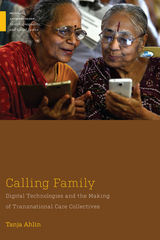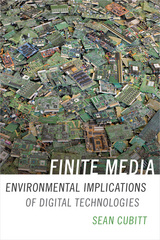4 books about Digital Technologies

Calling Family
Digital Technologies and the Making of Transnational Care Collectives
Tanja Ahlin
Rutgers University Press, 2023
How do digital technologies shape both how people care for each other and, through that, who they are? With technological innovation is on the rise and increasing migration introducing vast distances between family members--a situation additionally complicated by the COVID-19 pandemic and the requirements of physical distancing, especially for the most vulnerable – older adults--this is a pertinent question. Through ethnographic fieldwork among families of migrating nurses from Kerala, India, Tanja Ahlin explores how digital technologies shape elder care when adult children and their aging parents live far apart. Coming from a country in which appropriate elder care is closely associated with co-residence, these families tinker with smartphones and social media to establish how care at a distance can and should be done to be considered good. Through the notion of transnational care collectives, Calling Family uncovers the subtle workings of digital technologies on care across countries and continents when being physically together is not feasible. Calling Family provides a better understanding of technological relationality that can only be expected to further intensify in the future.
This book is also freely available online as an open access digital edition. The open access publication was financially supported by the Social Science Research Master and partly also by the Health, Care and the Body Programme Group of the Department of Anthropology, both at the Amsterdam Institute of Social Science Research, University of Amsterdam.
This book is also freely available online as an open access digital edition. The open access publication was financially supported by the Social Science Research Master and partly also by the Health, Care and the Body Programme Group of the Department of Anthropology, both at the Amsterdam Institute of Social Science Research, University of Amsterdam.
[more]

Finite Media
Environmental Implications of Digital Technologies
Sean Cubitt
Duke University Press, 2017
While digital media give us the ability to communicate with and know the world, their use comes at the expense of an immense ecological footprint and environmental degradation. In Finite Media Sean Cubitt offers a large-scale rethinking of theories of mediation by examining the environmental and human toll exacted by mining and the manufacture, use, and disposal of millions of phones, computers, and other devices. The way out is through an eco-political media aesthetics, in which people use media to shift their relationship to the environment and where public goods and spaces are available to all. Cubitt demonstrates this through case studies ranging from the 1906 film The Story of the Kelly Gang to an image of Saturn taken during NASA's Cassini-Huygens mission, suggesting that affective responses to images may generate a populist environmental politics that demands better ways of living and being. Only by reorienting our use of media, Cubitt contends, can we overcome the failures of political elites and the ravages of capital.
[more]

Sensing Health
Bodies, Data, and Digital Health Technologies
Mikki Kressbach
University of Michigan Press, 2024
In the age of Apple Watches and Fitbits, the concept of “health” emerges through an embodied experience of a digital health device or platform, not simply through the biomedical data it provides. Sensing Health: Bodies, Data, and Digital Health Technologies analyzes popular digital health technologies as aesthetic experiences to understand how these devices and platforms have impacted the way individuals perceive their bodies, behaviors, health, and well-being. By tracing design alongside embodied experiences of digital health, Kressbach shows how these technologies aim to quantify, track and regulate the body, while at the same time producing moments that bring the body’s affordances and relationship to the fore. This mediated experience of “health” may offer an alternative to biomedical definitions that define health against illness.
To capture and analyze digital health experiences, Kressbach develops a method that combines descriptive practices from Film and Media Studies and Phenomenology. After examining the design and feedback structures of digital health platforms and devices, the author uses her own first-person accounts to analyze the impact of the technology on her body, behaviors, and perception of health. Across five chapters focused on different categories of digital health—menstrual trackers, sexual wellness technologies, fitness trackers, meditation and breathing technologies, and posture and running wearables—Sensing Health demonstrates a method of analysis that acknowledges and critiques the biomedical structures of digital health technology while remaining attentive to the lived experiences of users. Through a focus on the intersection of technological design and experience, this method can be used by researchers, scholars, designers, and developers alike.
To capture and analyze digital health experiences, Kressbach develops a method that combines descriptive practices from Film and Media Studies and Phenomenology. After examining the design and feedback structures of digital health platforms and devices, the author uses her own first-person accounts to analyze the impact of the technology on her body, behaviors, and perception of health. Across five chapters focused on different categories of digital health—menstrual trackers, sexual wellness technologies, fitness trackers, meditation and breathing technologies, and posture and running wearables—Sensing Health demonstrates a method of analysis that acknowledges and critiques the biomedical structures of digital health technology while remaining attentive to the lived experiences of users. Through a focus on the intersection of technological design and experience, this method can be used by researchers, scholars, designers, and developers alike.
[more]

Transnational Korean Cinema
Cultural Politics, Film Genres, and Digital Technologies
Dal Yong Jin
Rutgers University Press, 2020
In Transnational Korean Cinema author Dal Yong Jin explores the interactions of local and global politics, economics, and culture to contextualize the development of Korean cinema and its current place in an era of neoliberal globalization and convergent digital technologies.
The book emphasizes the economic and industrial aspects of the story, looking at questions on the interaction of politics and economics, including censorship and public funding, and provides a better view of the big picture by laying bare the relationship between film industries, the global market, and government. Jin also sheds light on the operations and globalization strategies of Korean film industries alongside changing cultural policies in tandem with Hollywood’s continuing influences in order to comprehend the power relations within cultural politics, nationally and globally. This is the first book to offer a full overview of the nascent development of Korean cinema.
The book emphasizes the economic and industrial aspects of the story, looking at questions on the interaction of politics and economics, including censorship and public funding, and provides a better view of the big picture by laying bare the relationship between film industries, the global market, and government. Jin also sheds light on the operations and globalization strategies of Korean film industries alongside changing cultural policies in tandem with Hollywood’s continuing influences in order to comprehend the power relations within cultural politics, nationally and globally. This is the first book to offer a full overview of the nascent development of Korean cinema.
[more]
READERS
Browse our collection.
PUBLISHERS
See BiblioVault's publisher services.
STUDENT SERVICES
Files for college accessibility offices.
UChicago Accessibility Resources
home | accessibility | search | about | contact us
BiblioVault ® 2001 - 2025
The University of Chicago Press









